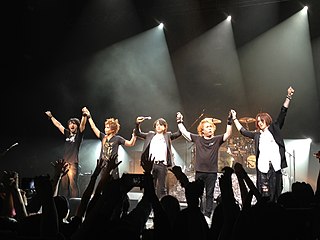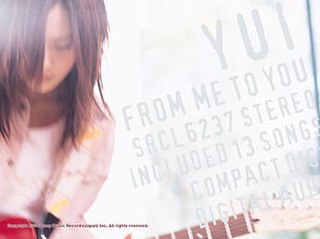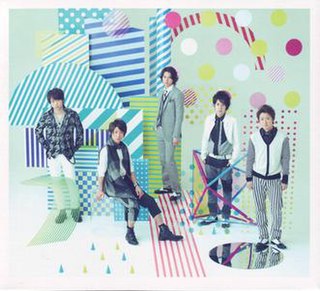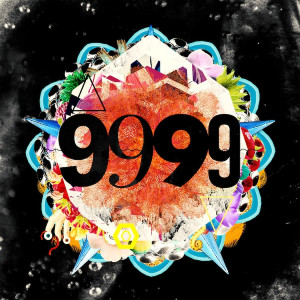J-pop, natively also known simply as pops, is the name for a form of popular music that entered the musical mainstream of Japan in the 1990s. Modern J-pop has its roots in traditional music of Japan, and significantly in 1960s pop and rock music. J-pop replaced kayōkyoku, a term for Japanese popular music from the 1920s to the 1980s in the Japanese music scene.

First Love is the debut Japanese-language studio album by Japanese-American recording artist Hikaru Utada, released on March 10, 1999, by Toshiba-EMI.

Luna Sea is a Japanese rock band formed in Kanagawa Prefecture in 1986. Due to the use of makeup and costumes early in their career and their widespread popularity, they are considered one of the most successful and influential bands in the visual kei movement. Throughout the mid-1990s they used significantly less makeup, and after a one-year break in 1997, came back with a more mainstream alternative rock style and toned down their on-stage attire. They disbanded in 2000. In 2003, HMV Japan ranked Luna Sea at number 90 on their list of the 100 most important Japanese pop acts.

Moon is the third full-length studio album released by Japanese solo artist Gackt on June 19, 2002. Instead of a booklet, the concept album comes with a printed note by the artist, asking readers to "sense" the record's story, rather than analyzing the lyrics. The booklet was eventually included in the packaging of Moon's 2003 follow-up Crescent. Both albums are linked, as well as his more recent albums Diabolos and Last Moon from the "Moon Saga".

From Me to You is the debut album by Japanese singer and songwriter Yui. It was released on February 22, 2006, by Sony Music Japan. The album title, From Me to You's message is "Kono uta subete, kimi ni" (この歌すべて、君に), which means "All of These Songs, to You" in English. From Me to You is primarily a pop rock record with elements of folk rock and blues rock. Lyrically, it explores themes of love, frustration, and relationships.

Tetsuya, formerly known as Tetsu, is a Japanese musician, singer-songwriter, and record producer, best known as bassist and bandleader of the rock band L'Arc-en-Ciel. Formed in 1991, they have sold over 40 million records, making them one of the best-selling music artists in Japan.

"Tears" is the ninth single by the Japanese rock band X Japan, released on November 10, 1993.

Mother is the fourth studio album by Japanese rock band Luna Sea, released on October 26, 1994. It reached number two on the Oricon Albums Chart and was certified Platinum by the RIAJ for sales over 400,000. Luna Sea re-recorded the entire album and released it on November 29, 2023, through Avex Trax.

Radwimps is a Japanese rock band who debuted independently in 2003 and signed with Toshiba EMI in 2005. The band's name, Radwimps, was formed from two English slang terms, "rad" and "wimp". According to the band, the coined word had several meanings, including "excellent weakling" and "superlative coward".
This is the discography for Japanese boy band KAT-TUN.

"Kimi ni Aitakute" (君に逢いたくて) is a single released by Gackt on October 27, 2004 under Nippon Crown. It peaked at second place on the Oricon Singles Chart and charted for seventeen weeks. In 2004, it was the 96th best selling single of the year, with sales of 98,335 copies. It ultimately sold 124,280 copies, making it Gackt's ninth best selling single. It was certified gold by RIAJ.
The following is a list of notable events and releases that occurred in 2010 in Japanese music.

Boku no Miteiru Fūkei is the ninth studio album by Japanese boy band Arashi. The album was released on August 4, 2010 in Japan under their record label J Storm in two editions: a first press version and a regular version. The album debuted at number-one on the Oricon weekly album chart, selling around 731,000 copies. As of August 2010, Boku no Miteiru Fūkei is the best-selling album of 2010 in Japan. On October 12, 2010, the album became the first album of the year to sell over a million copies in Japan. According to Oricon, Boku no Miteiru Fūkei is the best-selling album of 2010 in Japan. The album was released digitally on February 7, 2020.

"Kyōshinshō" is a song by Japanese rock band Radwimps, released on February 9, 2011 as the second of two singles preceding the band's sixth album, Zettai Zetsumei.

Are You Happy? is the fifteenth studio album of the Japanese idol group Arashi. The album was released on October 26, 2016 under their record label J Storm in two editions: a first press/limited edition and a regular edition. The regular edition comes with a 36-page lyrics booklet and the limited edition comes with an 80-page photo lyrics and a bonus DVD with the music video and making-of for "Don't You Get It?". The album sold over 636,000 copies in its first week and topped the Oricon charts. With more than 720,000 copies sold, the album was certified for Triple Platinum by the Recording Industry Association of Japan (RIAJ). It was released digitally on February 7, 2020.

The discography of the Japanese rock band One Ok Rock consists of ten studio albums, two EPs, and thirty-one singles. One Ok Rock was formed in Tokyo, Japan in 2005, consists of Takahiro Moriuchi (vocals), Toru Yamashita (guitar/leader), Ryota Kohama (bass) Alex,(formerly) on guitar, and Tomoya Kanki (drums). One Ok Rock have sold more than 3 million records worldwide.

9999 is the tenth studio album by Japanese rock band The Yellow Monkey, released on April 17, 2019 by Atlantic Records. It is the band's first album of new material in 19 years and their first since reuniting in 2016. The album was produced by lead singer Kazuya Yoshii, who also wrote almost all of the songs.

Dead Stock is the sixth studio album by Japanese visual kei rock band SID, released on February 23, 2011, by Ki/oon Records. It was released in three editions: the regular edition and the limited editions A and B.
"Ranbu no Melody" (乱舞のメロディ) is a single by Japanese rock band Sid, released on December 1, 2010, by Ki/oon Records. Opening theme of Bleach anime, it also figured on the television shows a-ha-N and Be-Bop! High Heele. The song was included on the Dead Stock album and SID Anime Best 2008-2017 compilation album.
"Uso" is a single by Japanese rock and visual kei band SID, released on April 29, 2009, by Ki/oon Records. It is ending theme of Fullmetal Alchemist: Brotherhood anime, and often considered the band's most successful song. It was included on the studio album Hikari and on Sid 10th Anniversary Best and SID Anime Best 2008-2017 compilations. CD Journal website described the song as sentimental, nostalgic and melancholic and Natalie related it as "sad and beautiful".















